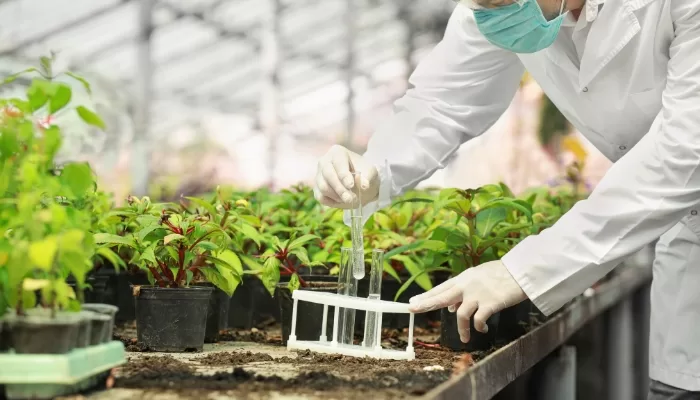Resources
Revolutionizing Farming: The Untold Role of Scientists in Africa’s Agricultural Landscape

- Climate change, pests, and restricted access to resources are among the obstacles that Africa’s smallholder farmers face as they strive for food security and economic development.
- Training experts in agricultural sciences and sustainable practices is critical for finding novel solutions that boost productivity and assist smallholder farmers.
- Initiatives such as the Alliance for Green Revolution in Africa and the International Institute of Tropical Agriculture demonstrate how scientific training may improve agricultural productivity and food security across the continent.
Africa’s agricultural industry is critical to the continent’s economy, powered primarily by millions of smallholder farmers who produce small parcels of land. These farmers are the backbone of food production, contributing significantly to food security and economic development. However, their efforts are frequently hampered by a variety of obstacles, including fluctuating weather conditions, pests, diseases, and limited access to markets and new technologies. Training scientists to solve these concerns is critical to assisting farmers and advancing sustainable agricultural growth in Africa.
Enhancing Agricultural Resilience with Scientific Innovation
Scientists play an important role in altering Africa’s agricultural landscape. They contribute by creating and adapting crop varieties that can tolerate extreme weather and pests, and remain productive in the face of environmental change. Their work contributes to increased crop yields, which improves food security across the continent.
In addition to crop development, scientists work to improve farming practices. By researching and advocating sustainable methods such as agroforestry, crop rotation, and organic farming, they assist farmers in maintaining soil fertility, reducing erosion, and increasing biodiversity. These strategies are critical for protecting the environment while increasing agricultural productivity.
Another important area of influence is the advancement of breakthrough technology. Scientists develop tools such as precision agricultural systems, remote sensing techniques, and mobile applications to help farmers make more informed decisions about their crops and livestock. These innovations assist smallholder farmers in improving efficiency, lowering expenses, and optimising their resources.
Essential Training Areas for Agricultural Scientists
Scientists must be knowledgeable in several critical areas to properly assist smallholder farmers in Africa. Agricultural sciences, such as plant breeding, agronomy, soil science, and plant pathology, are critical for producing resilient and high-yield crop types. Understanding climate change adaptation techniques is particularly important since it provides scientists with options for mitigating the consequences of climate shifts on agriculture.
Training in sustainable agriculture practices enables scientists to advocate environmentally friendly farming methods that not only safeguard the environment but also ensure long-term agricultural profitability. Furthermore, scientists should be proficient in technology transfer, ensuring that novel solutions reach farmers in a user-friendly and cost-effective manner. Extension services training is particularly important because it allows scientists to successfully transmit scientific knowledge to farmers, bridging the gap between research and practice.
Overcoming Challenges in Scientist Training
Agricultural development requires scientists to be trained, but various challenges inhibit this process. Many African countries face considerable challenges in building comprehensive training programs and research centres due to limited funds and infrastructure. Furthermore, brain drain is a continuous problem, with many talented scientists leaving the continent to pursue better prospects overseas.
Cultural and linguistic disparities between scientists and farmers can also create communication hurdles, making it difficult to properly impart scientific knowledge to those who require it the most. Despite these limitations, there are several ways to improve support for smallholder farmers.
Unlocking Opportunities with Collaboration and Technology
Partnerships are critical for closing the resource gap in agricultural training. Collaboration between governments, academic institutions, non-governmental organisations (NGOs), and the commercial sector allows for the mobilisation of required resources and skills. These collaborations can result in more effective training programs customised to the needs of smallholder farmers.
Advances in technology also create new chances for improving scientific training. Online learning platforms and mobile applications make educational content more accessible, removing geographical obstacles and lowering expenses. Regional cooperation among African states can improve knowledge sharing and resource allocation, resulting in a stronger support structure for agricultural development.
Case Studies that Highlight Scientific Contributions
Several efforts in Africa have already proved the benefits of training scientists to help smallholder farmers. Organisations have invested in programs to improve crop varieties and promote sustainable agricultural methods. These activities are aimed at increasing the scientific competence of individuals committed to addressing the agricultural difficulties faced by millions of smallholder farmers.
Research institutions have played an important role in developing technologies that meet the specific needs of African agriculture. These include drought-tolerant crops, pest-resistant types, and cutting-edge farming techniques that can dramatically boost crop yield. The future of African agriculture is bright if scientists are given the tools they need to address these difficulties.
Investing in Africa’s Agricultural Future
Training scientists in agricultural development is a critical step towards Africa’s agricultural industry becoming more robust and affluent. Equipping them with the information needed to develop creative solutions and provide technical assistance to farmers is critical for addressing the obstacles that smallholder farmers confront daily. Investing in scientific training not only increases agricultural output but also provides the groundwork for the continent’s long-term economic prosperity.
By allowing indigenous scientists to create strategies and technologies customised to Africa’s distinct agricultural setting, the continent may achieve better food security and economic stability. Africa’s agricultural industry can evolve with ongoing investment in education and training, providing farmers with the tools and resources they need to survive in a changing world.

























































